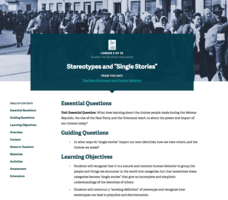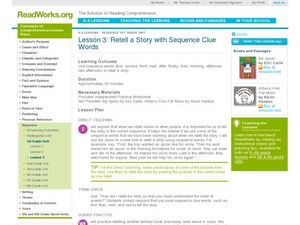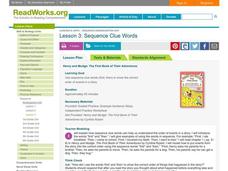Curated OER
Build Mastery: Sequencing
Writing a summary is much easier once you've laid out the sequence of events. Show readers how these two skills are intertwined using this graphic organizer. Review the meaning of sequencing first, presenting the chart and possibly...
Curated OER
In the Right Order
What comes first? Practice order of events with this sequencing activity. Learners examine two sets of pictures and write 1st, 2nd, and 3rd beneath the corresponding pictures. Encourage them to explain their reasoning, as there may be...
DocsTeach
The Titanic Disaster: One Survivor's Story
An activity focuses on Lucy Ridsdale, a survivor of the sinking of the Titanic. Scholars analyze primary sources and place them in the correct sequence. Academics also complete a worksheet and participate in group discussion to...
Facing History and Ourselves
Stereotypes and “Single Stories”
Help bring subconscious stereotypes to the surface to stop it in its tracks. Pupils first read an excerpt describing the experience of prejudice and analyze how this process connects to World War II. Then, they write a creative story...
Weston Wood
Joseph Had a Little Overcoat
Create a cross-curricular learning experience based on the children's book Joseph Had a Little Overcoat with this collection of learning activities. Starting with a class reading of the story, children go on to learn about the sequence...
Mathematics Vision Project
Module 1: Sequences
Take steps into sequences. An 11-lesson unit builds upon pupils' previous understanding of writing expressions to develop the idea of sequences. The resource explores both arithmetic and geometric sequences using recursive and explicit...
Houghton Mifflin Harcourt
Silly Stories: Challenge Activities (Theme 1)
This packet, the first in the series of support materials for the Houghton Mifflin Harcourt thematic units on silly stories, contains enrichment activities for learners who have mastered the basic concepts of the lessons.
Do2Learn
Sequencing Chart
Take note of events in a story with this organizer. Learners write down the who, what, where, and when, writing down four events in the order that they occur.
Do2Learn
Story Organizer
Kids can get all their plot points in line by filling out this graphic organizer with information from a story they have read. Pupils note down the title and author, the characters, the setting, and four events from the story.
IPDAE
Themes in Short Stories
"What is the theme of this story?" The very question can spark fear in the minds of readers and incinerate confidence. Here you will discover an exercise that shows how writers use the tools of setting, plot, conflict, and...
EngageNY
Creating Division Stories
Create your own adventure story ... well, not really. The fifth lesson in a 21-part series has pairs create story contexts for division problems. The lesson presents a step-by-step process for pupils to follow in writing such stories.
Houghton Mifflin Harcourt
American Stories: Extra Support Lessons (Theme 2)
Here's a packet designed especially for those kids who need extra support with the basic concepts in the Houghton Mifflin Harcourt thematic units on American stories.
Curated OER
The Mitten
Explore the Ukraine through a reading of The Mitten. Readers will determine the sequence of events, cause and effect, make predictions, and find the main idea of the story. They also use math skills to make charts and graphs. Finally,...
Curated OER
The Jacket: Journal Templates Teacher's Guide
Explore this story involving prejudice and racism to enhance learners' comprehension skills. The story The Jacket by Andrew Clements involves an African American boy who is falsely accused of stealing someone's jacket. This teacher's...
Curated OER
Marking Time
Two narrative excerpts tell the same story from different points of view. In the first excerpt (first person), sequencing words and phrases are bolded and learners write down what the bold type does. The second excerpt is in third...
Curated OER
Printing and Publishing
Explore African literature and artwork in a multicultural literacy and art lesson. Begin with a read aloud of Tiger and the Big Wind: A Tale from Africa, and afterward, have kids retell the main events in the story. They identify and...
Scholastic
A Tale to Tell!
A creative spin occurs when one pupil acts as author Ann M. Martin. Using a Q & A at the back of her book A Dog's Life, other classmates ask the "author" questions. They discuss the reasons why they know the book is from a...
Curated OER
Theatrical Economics
Read then role-play the characters from story of If You Give A Pig a Pancake. Young actors use improvisation and characterization to create the characters from the story. They will also write and role play original version of the story...
Curated OER
Sequencing a Story - The Three Little Pigs
In this sequencing worksheet set, students use cut up portions of the story of "The Three Little Pigs" to either categorize events from the beginning, middle and end, or to retell the story it the proper order. The teacher cuts out and...
Curated OER
Sequence of a Story within a Story
Fourth graders read a story. For this story sequencing lesson, 4th graders learn about the use of flashbacks in a story. Students read Tell Me a Story, Mama and identify flashbacks in the story.
Curated OER
Lesson 3: Retell a Story with Sequence Clue Words
First graders evaluate sequence words. In this order of events lesson plan, 1st graders practice using sequence words to retell a story. They do guided practice with the teacher retelling a story they have read as a class and then try it...
Curated OER
Story Pyramid
In this pyramid graphic organizer worksheet,students use the story organizer to sequence the events in a story. Students describe the five parts of the story.
Curated OER
Lesson 3: Exception Questions in Stories with a Flashback
Fourth graders respond to a text using textual evidence to support their answers to questions. Students observe the teacher model a quick warm up on the chronological sequence of events from the passage, Leaving Home. In this literacy...
Curated OER
Sequence Clue Words
Young learners use sequence words to describe pictures they draw of events happening in a story. To practice sequencing events, they use words such as first, then, next, and more.
Other popular searches
- Story Sequencing
- Story Sequencing Worksheets
- Picture Story Sequencing
- Story Sequencing Halloween
- Story Sequencing Activities
- Story Sequencing Rubric
- Sequencing Story Events
- Short Story Sequencing
- Story Sequencing Exercises
- Story Sequencing Pictures
- Story Sequencing Map
- Story Sequencing Lessons

























